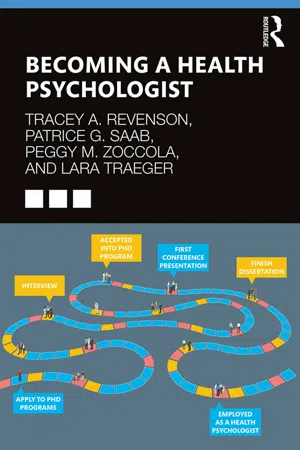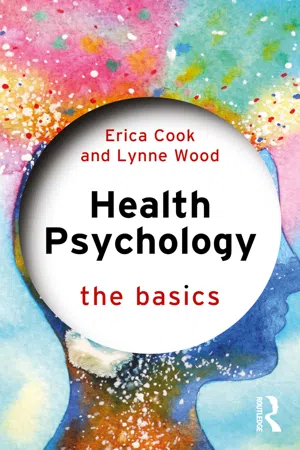Psychology
Health Psychology
Health psychology is a field that focuses on the psychological factors that influence health, illness, and healthcare. It explores how behaviors, emotions, and thoughts impact physical well-being, and how individuals can be empowered to make positive health-related choices. This interdisciplinary area integrates knowledge from psychology, medicine, public health, and other fields to promote holistic approaches to health and wellness.
Written by Perlego with AI-assistance
Related key terms
11 Key excerpts on "Health Psychology"
- eBook - ePub
- Tracey A. Revenson, Patrice G. Saab, Peggy M. Zoccola, Lara N. Traeger(Authors)
- 2019(Publication Date)
- Routledge(Publisher)
First, it states that the field of Health Psychology is based on the biopsychosocial model, first developed by a psychiatrist, George Engel, in 1977 and adopted in psychology soon after (Schwartz, 1982). In the biopsychosocial model (see Figure 1.1), health and disease outcomes are not the result of some single cause-single effect pathway, but the results of multiple interacting influences, some biological, some psychological, and some from individuals’ social environments. Second, Health Psychology is relevant along the entire continuum of health to illness—from promoting health and wellness to the prevention of disease (e.g., cancer screening, smoking cessation programs) to making difficult medical decisions and adhering to medical treatment and to living with chronic illness. Third, Health Psychology is research-based. This involves conducting original research to determine the causes and consequences of health conditions and using evidence-based treatment approaches (that is, those based on research evidence) in clinical practice. Fourth, Health Psychology is a field that serves the public interest by producing research findings that can improve health and quality of life for all people (not just those who have easy access to healthcare). During the past four decades, health psychologists have worked to understand the biological, psychological, and social factors that affect health, health behavior, and illness. They have worked to turn those answers into help for people faced with illness or for those who might benefit from changing their health behavior. Recently, the first author of this book suggested that we move toward a biopsychosociocultural model in order to address important questions of health disparities and inequities (Revenson & Gurung, 2019) - eBook - ePub
Health Psychology
The Basics
- Erica Cook, Lynne Wood(Authors)
- 2020(Publication Date)
- Routledge(Publisher)
The movement from thinking about our mind and body as separate to viewing health and illness from a biopsychosocial perspective has been the catalyst for Health Psychology. Our understanding of how the environment and our behaviour impact on our health, the more holistic approach to conceptualising health along with recent public health trends have made Health Psychology one of the fastest growing disciplines of psychology in the UK.Health Psychology is described by Matarazzo asthe aggregate of the specific educational, scientific, and professional contributions of the discipline of psychology to the promotion and maintenance of health, the prevention and treatment of illness, and the identification of etiologic and diagnostic correlates of health, illness, and related dysfunction [13].(p. 815)The aim of Health Psychology is to understand the psychological processes which underpin health and illness and use this knowledge to promote and maintain health, prevent illness and disability and enhance outcomes for those who are ill [14].Health psychologists therefore may ask the following questions:• What is the role of behaviour in the aetiology of illness? So, what lifestyle factors impact on disease progress, for example smoking and coronary heart disease.• How can we predict health behaviours? To be able to intervene in health behaviour we have to understand why we behave the way we do. Ultimately how can we make somebody eat more healthily and do more physical activity. We discuss this in more detail in Chapter 3 - eBook - ePub
- Anthony Curtis(Author)
- 2002(Publication Date)
- Routledge(Publisher)
1 Introduction to Health Psychology Defining Health Psychology Historical perspective on health and illness The biomedical model The biopsychosocial model Psychology and health Models of behaviour change SummaryWelcome to the fascinating area of Health Psychology! This text aims to provide an insight into the many fields that make up Health Psychology. You may be a student, nurse or other practitioner in the health field, or just seeking to find out more about your health and the role that psychology can play in understanding health states and health status. I hope that this book is of interest to you and relevant to your needs.Defining Health PsychologyIn trying to define Health Psychology, one must first try and define what is meant by ‘health’ as a concept. The most commonly quoted definition of health is provided in the Constitution of the World Health Organization (WHO, 1946):Health is a state of complete physical, mental and social well-being, and not merely the absence of disease or infirmity.This definition is considered to have positive and negative attributes by Downie et al. (1996). In the first part of the definition, they argue that health is seen in positive terms (i.e. the presence of a positive quality: well-being). In the second part of the definition, health is viewed (in a negative sense) as involving the absence of disease or infirmity (themselves negative in connotation). Taken together, the definition implies that true health involves both a prevention of ill-health (e.g. disease, injury, illness) and the promotion of positive health, the latter of which has been largely neglected.Banyard (1996) has criticised the above definition on the grounds that a state of complete - eBook - ePub
- Ian Albery, Marcus Munafo(Authors)
- 2008(Publication Date)
- SAGE Publications Ltd(Publisher)
DEFINING Health Psychology 1 ONE DEFINING Health Psychologyand: bio-medical model psychosomatic medicine biopsychosocial model Health Psychology social inequalities in health epidemiology of health and illnessWhat is this discipline we call ‘Health Psychology’? Where did it originate and what was its developmental sequence? How is Health Psychology distinct from other areas that psychologists have submerged themselves in? This initial chapter focuses on these questions and details historically the approaches to health and illness which have contributed to the development of Health Psychology as a sub-discipline of psychology in general. In addition, we outline how Health Psychology is conceptualized and what the parameters of the discipline are, as well as the aims and objectives that underpin the area of study. Having examined approaches to health and illness and provided a definition of the area, a number of concepts are presented that detail terms that are of direct contextual relevance for the study of psychological processes in the aetiology and treatment of illness and the prevention of negative health outcomes. The first revolves around the question of what is the relationship between various social inputs on the one hand and the experience of negative health outcomes on the other? More importantly, what is the role of psychological factors in describing this relationship? The second draws on the concept of epidemiology in ascertaining the magnitude and nature of health and illness, and the role psychology plays in establishing reasons for figures related to numbers of people experiencing adverse health and/or undertaking maladaptive health behaviours. - eBook - ePub
- Peter Spurgeon, Roy Davies, Antony Chapman(Authors)
- 2015(Publication Date)
- Routledge(Publisher)
16 Health Psychology J. WEINMAN INTRODUCTIONHealth Psychology is one of the newest disciplinary areas of psychology, even though many of its core themes can be traced back to earlier times. It is concerned with the application of psychological methods to understanding human behaviour in the context of health and illness. The most widely used definition of the field has been provided by Matarazzo (1980), who described Health Psychology as the “aggregate of specific educational, scientific and professional contributions of the discipline of psychology to the promotion and maintenance of health, the prevention and treatment of illness, and the identification of aetiologic and diagnostic correlates of health, illness and related dysfunction”. In the present overview the field of Health Psychology will be divided into six broad areas which fit well with the range of topics outlined by Matarazzo.The disciplinary emergence of Health Psychology can be traced back to the 1970s and a task force which was set up by the American Psychological Association (APA) to assess the role of psychology in relation to health and health care. In the report of this task force it was concluded that psychologists should become more involved in research on aspects of health and illness and in developing applications to bring about improvements in the maintenance of health, the prevention of illness and the delivery of health care. Consequently the APA formed a separate division of Health Psychology and shortly after this the first specialist books and journals started to appear.In the United States there have been considerable developments in undergraduate teaching and in postgraduate training in Health Psychology. The postgraduate programs have taken a number of contrasting approaches. Some have adopted a ‘Clinical Health Psychology’ approach in which the major emphasis is on acquiring skills in applying clinical interventions, typically for individuals or small groups for preventive or treatment purposes. Other programs have developed a more research-based, disciplinary approach and a third group of programs have concentrated on a preventive/public health orientation with an emphasis on the maintentance of good health and the prevention of health problems. - eBook - ePub
- (Author)
- 2012(Publication Date)
- Wiley(Publisher)
integration of biological, cognitive, affective, social, and psychological bases of behavior with biological, cognitive, affective, social, and psychological bases of health and disease. Health Psychology also includes knowledge of health policy and the organization of health-care delivery systems. It is a very broad field, characterized by studies in health behavior, behavioral risk factors for illness, response to illness, the impact of social support on health, culture and health, physician–patient relationships, psychoneuroimmunology, and psychophysiology, among others.Clinical Health Psychology is the term used for application of Health Psychology in professional practice. This specialty is dedicated to both the development of knowledge and the delivery of services to individuals, families, and health-care systems of high quality services based on that knowledge (American Psychological Association [APA], 1997).Roots of the Field
The roots of Health Psychology are in the history of mind–body relationships along with those of other fields such as philosophy, theology, mathematics, astrology, and medicine. In writings dating back 5,000 years, mind–body relationships were very much the concern of priests, alchemists, shamans, or healers, and throughout that history a multiplicity of views converged in two alternating approaches: a unitary view that postulates that mind and body are indivisible and a dualistic view that sees them as separate entities. The roots of Health Psychology can be traced back to the unitary view of mind–body relationships (Taylor, 1999). Our knowledge of prehistoric societies indicates that humans considered mind and body as a unit, attributing physical and mental illnesses to demonic possession or evil spirits. The early writings of Hebrews, Egyptians, and Chinese confirmed this supernatural view of causality. Stone Age archaeological findings in Europe and South America show evidence of a surgical procedure called trephination that some claim shamans used to allow evil forces to leave the body (Selling, 1940).In ancient Greece, the unitary view evolved to include naturalistic causes of disease, opening the way to modern medicine. Plato (427–347 B.C.) wrote that “it is not proper to cure the eyes without the head, nor the head without the body, so neither it is proper to cure the body without the soul.” Aristotle, in 350 B.C., observed how emotions like joy, fear, anger, and courage affect the body, thus linking bodily processes to emotional states (Gentry & Matarazzo, 1981; Lipsitt, 1999). However, it was the Greek physician Hippocrates (460–377 B.C.), often called the father of modern medicine, who proposed a humoral theory of illness later expanded by Galen (A.D. 129–199). This was a hydraulic model that postulated that disease would result from the imbalance of four bodily fluids or humors—blood, black bile, yellow bile, and phlegm (Lipowski, 1986). Galen proposed four personality types based on the predominance of one of the four humors (choleric, melancholic, sanguine, and phlegmatic); these types permeated European personality theories for centuries thereafter. In sum, the ancient Greeks believed that mind and body were part of one system, that a balance between physical and emotional states was fundamental to health, and that psychological factors could influence bodily functions or even cause disease. - eBook - ePub
Psychology and Social Work
Applied Perspectives
- Gabriela Misca, Peter Unwin(Authors)
- 2017(Publication Date)
- Polity(Publisher)
Health Psychology is devoted to understanding the psychological factors associated with health and illness, and it focuses on health promotion and the prevention and treatment of illness alongside health policy formation. Health psychologists share fields of practice with social work, nursing and other disciplines aimed towards understanding and changing health-related behaviour. As health and illness are conceptualized on a continuum, Health Psychology is concerned with the onset of illness, help seeking, symptom perception, illness cognitions, illness adaption, behaviour change, social support and health outcomes, all of which are potential social work practice arenas as well.Matarazzo (1982: 4) provided one of the first formulations of a definition of Health Psychology, as:the aggregate of the specific educational, scientific, and professional contributions of the discipline of psychology to the promotion and maintenance of health, the prevention and treatment of illness, the identification of etiologic and diagnostic correlates of health, illness, and related dysfunction, and to the analysis and improvement of the health care system and health policy formation.The way in which social workers approach the assessment of people’s needs involves the individual, their family setting and the wider environment. When a person’s circumstances are affected by poor health, social workers must consider ways in which support can be provided, both for the individual involved and for their family.Applying Health Psychology to social work practice
Health Psychology and social work share many areas of focus and concerns as well as common approaches, as both professions seek to help individuals and families to overcome complex problems. Most social workers deal with families where damaging health behaviours – smoking, lack of exercise, stress, unhealthy relationships, substance abuse, heavy medication regimes – are the reality and are often exacerbated by environmental issues such as poverty, poor housing environment and ill health. - Amy E. Wenzel(Author)
- 2017(Publication Date)
- SAGE Publications, Inc(Publisher)
behavioral medicine is often used to describe the interdisciplinary field concerned with the application of knowledge from Health Psychology and other fields to disease prevention, diagnosis, treatment, and rehabilitation.Change Your Behavior, Change Your Health
Most chronic illnesses are heavily influenced by lifestyle habits and health behaviors. Health behaviors include actions that either promote better health or impose risk for health problems. For instance, the regular use of cigarettes and eating a high-fat diet can increase risk for cardiovascular illness, whereas regular stress management activities and physical activity provide protection against a number of illnesses. Health psychologists have made great strides in understanding what influences behavioral choices and what affects health behavior change. The development of theoretical models provides a framework for conducting such work. Most major theories designed to predict and influence health-related behaviors describe behavior as some combination of vulnerability, attitudes, benefits, and self-efficacy. The health belief model is one such widely used framework, proposing five factors that contribute to the likelihood of taking preventive action: (1) perceived susceptibility, (2) severity, (3) benefits, and (4) costs, as well as (5) cues to action. For example, a woman will be more likely to seek mammography screening for breast cancer if she believes breast cancer to be a serious and severe threat, the benefits of screening outweigh the costs, the barriers to receiving screening are minimal, and she considers mammography to be a valuable screening tool. Reminders in her everyday environment to take action, such as a phone call from a physician’s office or an advertisement on the subway, will further encourage her motivation to engage in mammography.- eBook - ePub
- Darren Edwards, Stephanie Best, Darren Edwards, Stephanie Best(Authors)
- 2020(Publication Date)
- SAGE Publications Ltd(Publisher)
- Discuss some specific psychological therapies used by health psychologists
Introduction
The World Health Organization (WHO) has defined health for over half a decade as ‘a state of complete physical, mental and social well-being, and not merely the absence of disease or infirmity’ (World Health Organization, 1948). This is different from the dominant view of the biomedical model which has dominated medicine for many years and which defines health strictly as the absence of disease (Rosen, 1991). This strict definition referring to the absence of disease has been challenged in medicine more recently and these challenges have given rise to the biopsychosocial model of health where other factors of social, psychological, as well as biological components are now accepted in mainstream medicine (Engel, 1977). It has now been recognised that people’s perceptions and expectations about their health, symptoms and treatment can have profound effects on their actual health and well-being (Di Blasi et al., 2001).The relationship between health and psychology are substantial; for instance, a meta-review including over 1.7 million patients and a quarter of a million deaths found that patients with affective disorders have a reduced life expectancy equivalent to the effects of heavy smoking (Chesney et al., 2014). Unfortunately, though, the WHO definition for health has been criticised as being unachievable, contributing to the over-medicalisation of society and minimising the human capacity to cope (Huber et al., 2011). The numbers of people who need mental health treatment and do not receive it exceeds 50 per cent in all countries and reaches 90 per cent in those with less resources (Patel et al., 2010). This problem is apparent in some evidence which has highlighted a treatment gap combined with a treatment lag – the delay in receiving mental health treatment when it is required has been estimated to be as long as ten years (Wang et al., 2004), and represents a serious obstacle that remains to be overcome. - eBook - ePub
- John Weinman, Mary A. Jansen(Authors)
- 2022(Publication Date)
- Routledge(Publisher)
whole patient in the context of his/her total biopsychosocial environment.The practitioner needs training in research skills in order to critically evaluate research reports in this rapidly developing area, to conduct the program evaluations so often required for professional accountability, and to extend the knowledge base of clinical Health Psychology practice. Stan Maes’ article in this volume more fully details issues concerning research training in Health Psychology.In addition to core psychology training, the clinical health psychologist must obtain knowledge and skills in the following areas:†† These areas have been recommended by the National Working Conference on Education and Training in Health Psychology held in 1983 in New York, USA (Stone, 1983 ).- social bases of health and disease
- biological bases of health and disease
- psychological bases of health and disease
- health policy, systems and organizations
- health assessment, consultation and intervention
- health research methods
- ethical, legal and professional issues associated with health
- interdisciplinary collaboration
Expertise can be developed through both coursework and field training experiences. However, to provide quality education and training in clinical Health Psychology the program must arrange for exposure to health care settings, a multidisciplinary faculty and experienced clinical health psychologists who can serve as mentors in the training process. - eBook - ePub
- Mark Forshaw, Mark J. Forshaw(Authors)
- 2021(Publication Date)
- Routledge(Publisher)
really a chameleon (just when I need to be). I think Health Psychologists are more like panthers. An umbrella term for a variety of expertise and interests. We have an impressive knowledge and skill set, and we can add value, which other health professionals cannot. We are not a common allied health professional, which should be to our advantage (when we know how to make it so). I am a rounded professional proud of calling myself a Health Psychologist and able to explain the complexity and variation in what I, and we (as a profession) can offer. But this has been challenging to get here, not least because I have been finding my unique way, and ‘sussing out’ what I am good at, what I enjoy and of course what I am less keen doing, but learning how to explain and sell myself, and feeling comfortable with doing so, given I don’t fit into a box. I do not think Health Psychologists ever will: this is our charm.At the heart of what I do is to improve experiences for those at the user-end of the topic. This can be: assessing health risks and seeking to reduce health inequalities across a population or community, working with the public to design, engage and evaluate health improvement interventions; it can providing psychological support for clients managing their long-term condition; it can be engaging research participants in and with the evidence I am developing; it can be students whom I motivate to become the Health Psychologists of the future. I am committed to developing and utilising the Health Psychology evidence base, implementing Health Psychology into practice wherever relevant. Health Psychology is relevant to all ; to those who are ill and managing health conditions, to those who are healthy and wanting to stay so. Thus, Health Psychology is an exciting profession to be part of because it is relevant for every workplace, every organisation, healthcare prevention and healthcare treatment. Every public and private sector can employ and work with a Health Psychologist, and for that, I will continue to be adaptable and responsive to their needs, because I can, and I have some additional knowledge and skills. I love being part of a profession which is varied and unique, with so much to offer. Until recently I had not considered my profile and evaluated who I am as a Health Psychologist. I do what I enjoy and what I’m good at. I welcome newcomers into our profession, and I am open to new discussions or those seeking out information or support.References
Abayomi, J. C., Charnley, M. S., Cassidy, L., McCann, M. T., Jones, J., Wright, M., & Newson, L. M. (2020). A patient and public involvement investigation into healthy eating and weight management advice during pregnancy. International Journal for Quality in Health Care , 32(1), 28–34. doi:10.1093/intqhc/mzz081 .Arden, M. A., Byrne-Davis, L., Chater, A. M., Hart, J., McBride, E., & Chilcot, J.
Index pages curate the most relevant extracts from our library of academic textbooks. They’ve been created using an in-house natural language model (NLM), each adding context and meaning to key research topics.










